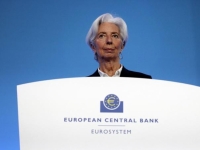Business
ECB raises the three key interest rates by 75 basis points
Against the up inflation
USPA NEWS -
The Governing Council of the European Central Bank (ECB) on Thursday decided to raise the three key ECB interest rates by 75 basis points. This major step frontloads the transition from the prevailing highly accommodative level of policy rates towards levels that will ensure the timely return of inflation to the ECB’s 2% medium-term target. Based on its current assessment, over the next several meetings the Governing Council expects to raise interest rates further to dampen demand and guard against the risk of a persistent upward shift in inflation expectations. The Governing Council will regularly re-evaluate its policy path in light of incoming information and the evolving inflation outlook. The Governing Council’s future policy rate decisions will continue to be data-dependent and follow a meeting-by-meeting approach.
The Governing Council took this decision, and expects to raise interest rates further, because inflation remains far too high and is likely to stay above target for an extended period. According to Eurostat’s flash estimate, inflation reached 9.1% in August. Soaring energy and food prices, demand pressures in some sectors owing to the reopening of the economy, and supply bottlenecks are still driving up inflation. Price pressures have continued to strengthen and broaden across the economy and inflation may rise further in the near term. As the current drivers of inflation fade over time and the normalisation of monetary policy works its way through to the economy and price-setting, inflation will come down. Looking ahead, ECB staff have significantly revised up their inflation projections and inflation is now expected to average 8.1% in 2022, 5.5% in 2023 and 2.3% in 2024.
After a rebound in the first half of 2022, recent data point to a substantial slowdown in euro area economic growth, with the economy expected to stagnate later in the year and in the first quarter of 2023. Very high energy prices are reducing the purchasing power of people’s incomes and, although supply bottlenecks are easing, they are still constraining economic activity. In addition, the adverse geopolitical situation, especially Russia’s unjustified aggression towards Ukraine, is weighing on the confidence of businesses and consumers. This outlook is reflected in the latest staff projections for economic growth, which have been revised down markedly for the remainder of the current year and throughout 2023. Staff now expect the economy to grow by 3.1% in 2022, 0.9% in 2023 and 1.9% in 2024.
The lasting vulnerabilities caused by the pandemic still pose a risk to the smooth transmission of monetary policy. “The Governing Council will therefore continue applying flexibility in reinvesting redemptions coming due in the pandemic emergency purchase programme portfolio, with a view to countering risks to the transmission mechanism related to the pandemic,” said the ECB.
Key ECB interest rates
The Governing Council decided to raise the three key ECB interest rates by 75 basis points. Accordingly, the interest rate on the main refinancing operations and the interest rates on the marginal lending facility and the deposit facility will be increased to 1.25%, 1.50% and 0.75% respectively, with effect from 14 September 2022. Following the raising of the deposit facility rate to above zero, the two-tier system for the remuneration of excess reserves is no longer necessary. Also the Governing Council therefore decided to suspend the two-tier system by setting the multiplier to zero.
The Governing Council intends to continue reinvesting, in full, the principal payments from maturing securities purchased under the APP for an extended period of time past the date when it started raising the key ECB interest rates and, in any case, for as long as necessary to maintain ample liquidity conditions and an appropriate monetary policy stance.
To preserve the effectiveness of monetary policy transmission and safeguard orderly market functioning, the Governing Council of the European Central Bank (ECB) on Thursday decided to temporarily remove the 0% interest rate ceiling for remunerating government deposits. Instead, the ceiling will temporarily remain at the lower of either the Eurosystem’s deposit facility rate (DFR) or the euro short-term rate (€STR), also under a positive DFR. The measure is intended to remain in effect until 30 April 2023. This change will prevent an abrupt outflow of deposits into the market, at a time when some segments of the euro area repo markets are showing signs of collateral scarcity, and will allow for an in-depth assessment of how money markets are adjusting to the return to positive interest rates.
As it currently stands, the relevant legal framework provides that, if the DFR is negative, government deposits are remunerated up to the DFR or the €STR, whichever is lower. It also foresees a remuneration ceiling of 0% if the DFR is 0% or higher. However, market and liquidity conditions have changed since this ceiling was put in place and a temporary adjustment of the remuneration arrangements, in a context of normalisation of monetary policy, is warranted. The new temporary change to the remuneration does not alter the long-term desirability of encouraging market intermediation, and the ECB calls on relevant depositors to plan for alternative arrangements to central bank deposits.
Liability for this article lies with the author, who also holds the copyright. Editorial content from USPA may be quoted on other websites as long as the quote comprises no more than 5% of the entire text, is marked as such and the source is named (via hyperlink).






